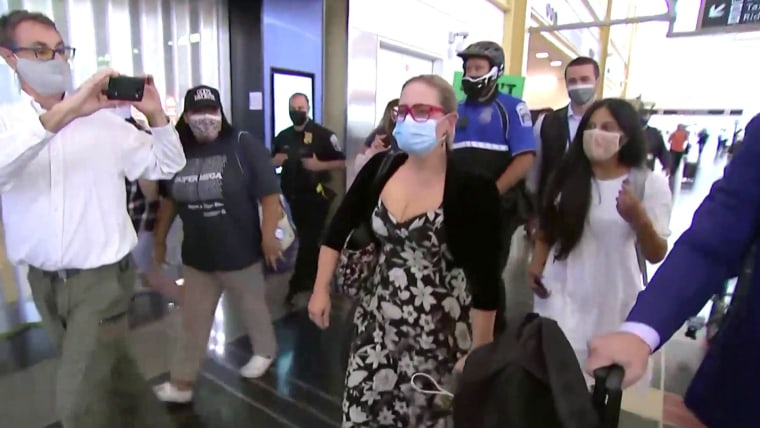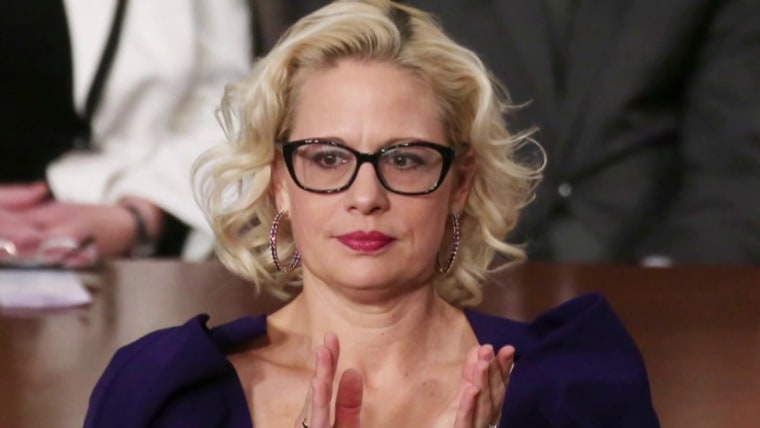WASHINGTON — Democrats in Washington and across the country have been wondering the same thing for months: how they can wear down Sen. Kyrsten Sinema, D-Ariz. The answer might be that they can't.
Sinema, a political progressive turned moderate, is holding President Joe Biden's "Build Back Better" social spending bill hostage, along with Sen. Joe Manchin, D-W.Va.
Biden, along with White House officials and Democratic activists, have tried nearly every imaginable strategy to get Sinema to abandon or soften her demands. Those demands include the House passing a bipartisan infrastructure bill first, shrinking the overall size of the "Build Back Better" bill and abandoning income-tax rate hikes for corporations and high-end earners.
Biden has sat down repeatedly with Sinema, still in her first term. At other times, Democratic leaders have tried to isolate her. Arizona activists took the opposite approach, pursuing Sinema into a bathroom earlier this month to harangue her. Last week, five members of her veterans advisory council resigned, citing her "unwillingness to act on behalf of [her] constituents’ needs."
And Democratic officials in Washington and Arizona have tried to create an electoral threat by recruiting Rep. Ruben Gallego, D-Ariz., to announce now that he will run a primary campaign against Sinema — in 2024.
None of it has worked.
Critics suggest that Sinema is in the pocket of various industry donors to her campaigns or seeking to carve out a "maverick" reputation, like longtime Republican Sen. John McCain, in Arizona.
But friends say her approach is consistent with a political philosophy that emphasizes credibility with colleagues, working across the aisle and rejecting single-party legislation.
In keeping with Sinema's desire to keep private negotiations out of the public sphere, several of her allies, including those in the legislative, lobbying and donor ranks, declined to speak about her. But others, who spoke on the condition of anonymity, say she's being maligned and mischaracterized.
"She’s kind of a head-down hard worker and she just doesn’t play the game the same way" as many other members of Congress, said one lawmaker who is close to her. "It gets lost in the 'Saturday Night Live' view of her, which is off. People just don't understand her."
Sinema described her own legislative philosophy — and how it changed when she was in the Arizona legislature — in a 2009 book.
Sinema wrote that she came into elective office as a partisan bomb-thrower and found that she had ostracized herself from serious negotiations on legislation. She decided she wanted to be part of coalitions that could pass, kill or amend legislation and transformed her approach to colleagues with different views.
She also decried the modern era of hyper-partisanship in Congress, in which "wholesale ideas created by one party were brought to the floor and ushered through." Politicians have not "made any real effort to change the way we do business, and so the hyper-partisanship continues," she wrote.
Sinema's approach is designed to get the kind of buy-in from the parties and the public that ensures legislation isn't repealed when power shifts in Washington, according to spokesman John LaBombard.
"She would much prefer sturdier, long-term legislative solutions for everyday people as opposed to short-term partisan victories that have a tendency to be wiped out in a new majority just a couple of years down the road," he said.
LaBombard said she wants to strike a deal on the "Build Back Better" plan.
"She would not be involved in these negotiations for months if she wasn't trying to get to a deal," he said.
The lawmaker and other sources who have spoken to Sinema during the debate over the "Build Back Better" proposal say that she laid out her principles to the White House early in the process and has not moved off of them. For example, when she cast a vote to allow Biden's social spending measure to advance in August, Sinema said that she wouldn't support Biden's $3.5 trillion target and wouldn't vote for "Build Back Better" until the House sends the infrastructure package to the president.
Behind closed doors, she has reiterated those positions ever since.
"She gave her word to people," the lawmaker said. "She feels strongly about that word."
In one of her few public comments in recent weeks, Sinema slammed Democratic leaders — including Biden by implication — for canceling a planned vote on the infrastructure bill so that they could keep negotiating the "Build Back Better" measure.
Many Democrats are furious with her, both because her positions are forcing progressives to make concessions on tax policy, prescription drug costs and efforts to combat climate change and because she isn't talking about them in public.
Many Arizona Democrats accepted political reality when Sinema ran for her seat as a moderate in 2018, Gallego said, but have been disappointed in her intransigence.
"We always thought in the end, when push came to shove, given the situation such as this where her vote would be transformational in terms of changing millions of people’s lives, that she would make the right call and the fact is she’s not making the right call," Gallego said in an interview. "Now she’s negotiating in secret and not talking to her constituents."
Gallego, a Harvard graduate and Marine Corps veteran, added that he is "not focusing on anything related to 2024."
Biden, who campaigned on bipartisanship in 2020 and often found himself among the swing votes as a senator, has taken a different tack toward Sinema than many of his Democratic allies. While she has been portrayed as enigmatic and corrupt, Biden called Sinema "smart as the devil" at a CNN town hall last week, even as he laid out positions she has been reluctant to make public.
He said he is trying to figure out how to collect enough money to pay for as much of his agenda as he can given Sinema's refusal to "raise a single penny" through individual and corporate income taxes. He met with Manchin and Senate Majority Leader Chuck Schumer, D-N.Y., at his home in Wilmington, Delaware, Sunday, but Sinema did not attend the breakfast.
In an interview with MSNBC's Jonathan Capehart Sunday, Sen. Elizabeth Warren, D-Mass., outlined how she is working with Sinema to find ways to tax the wealthy without raising income tax rates on individuals and corporations.
"The axis that I’ve been arguing for for a long time now is to say we need a tax on the billionaires, we need a tax on the billionaire corporations that haven’t been paying taxes, and we need to enable the IRS to go after the billionaire tax cheats," Warren said, referring to a tax on individual wealth rather than income, international tax rules and federal enforcement of existing taxes. "Those three things are how we can form the core of the revenues we need to be able to do the things we need to do for the American people," she said.
The challenge for Democratic leaders is not that Sinema is enigmatic or erratic, it's that she is holding firm to positions they don't agree with.
But if they can pass Biden's plan in some form, it will not be in spite of Sinema. They have to do it with her.
"What" - Google News
October 25, 2021 at 05:21PM
https://ift.tt/3nnWxMt
What drives Sinema? A different view of politics - NBC News
"What" - Google News
https://ift.tt/3aVokM1
https://ift.tt/2Wij67R
Bagikan Berita Ini
















0 Response to "What drives Sinema? A different view of politics - NBC News"
Post a Comment